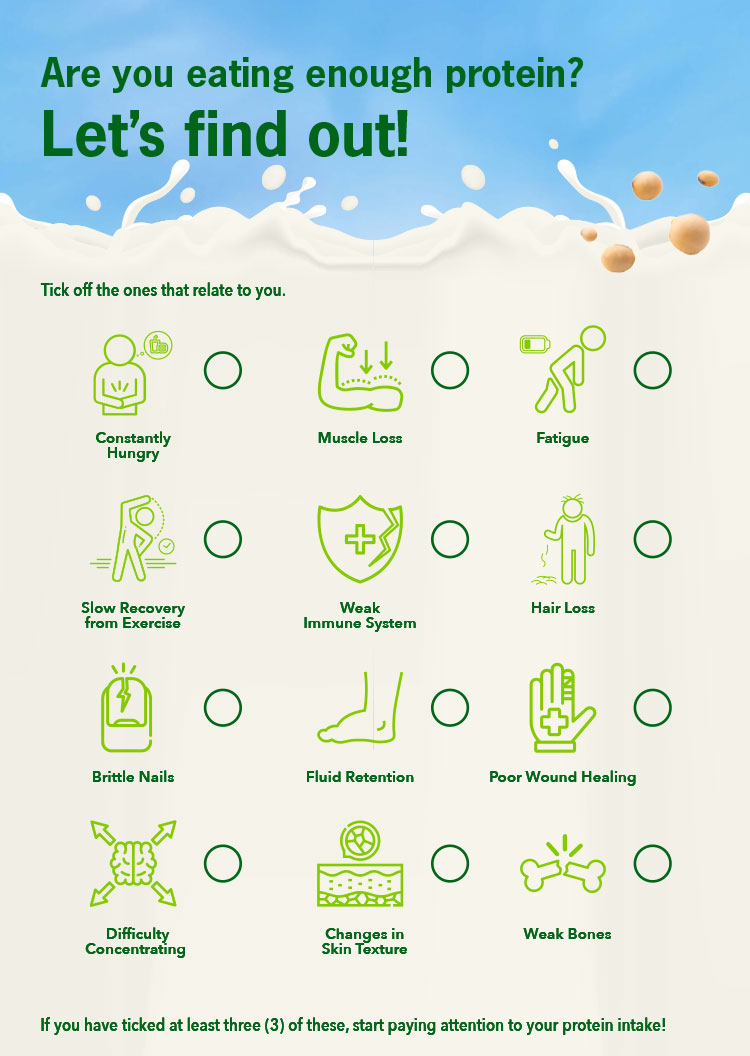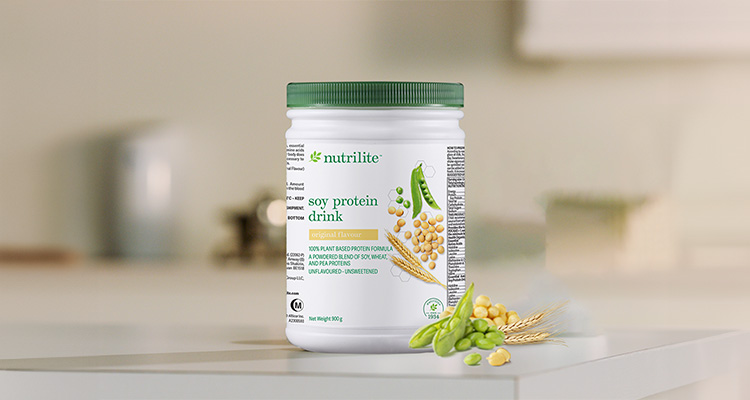We’ve covered how protein is an essential macronutrient that is crucial to good health here. From beautiful hair to the strength of our muscles, protein works tirelessly to keep everything running smoothly.
But beware! Did you know at lack of protein can trigger some serious red flags? Are you having signs or symptoms of lacking protein? Here's a checklist to help you spot the signs.
Here's a hot tip: The checklist is printable! That means you can go through this checklist anytime, anywhere, with your loved ones—family, friends.

Click here to view the full Protein eLeaflet and learn more about Nutrilite Soy Protein Drink.
Ever wondered why missing out on protein can lead to some of the above lacking protein symptoms? Here's the lowdown on why we need protein:

Collagen, keratin and elastin, highly associated with hair, skin, and nails are made of protein. Protein is essential for maintaining healthy hair, skin, and nails. Protein deficiency can result in thinning hair, sagging skin, and brittle nails, affecting both appearance and function.
Protein is crucial for tissue repair and wound healing by reducing the rate of muscle loss during the recovery and improve insulin sensitivity, resulting to speed healing. If you’re not consuming enough protein, you may notice your injuries take longer to heal as your body's ability to recover is significantly hindered.

Protein plays a key role in energy production through metabolism regulation. Low protein intake may result to anaemia, when your cells are not getting enough oxygen, slowing down your metabolism and leaving you feeling lethargic, sleepy, tiredness and easily fatigued.

Protein plays a key role in ensuring optimal function of the muscles responsible for your posture, movement and protecting your bones health. Insufficient intake of protein resulted to muscle mass loss that equal to loss of muscle strength that makes it harder to keep your balance, indirectly weaken your bones and increase the risk of fractures, especially as you age.

Protein is necessary for a strong body defense system via amino acids, the building blocks of protein. Your body defense and immune system uses amino acids in the production of antibodies that activate while blood cells to fight off viruses, bacteria and toxins. A protein deficiency can weaken your body's ability to fight off infections and illnesses, making you more susceptible to the illness.

Protein and high-protein foods fuels you and keep you full longer by reducing your hunger hormone - ghrelin. It also boosts the level of peptide YY, a hormone that makes you feel full. If you’re lacking protein, you may notice a sudden feel of hunger or quicker to feel hungry even after a meal.
Involuntary muscle loss, known as sarcopenia, is a common consequence of ageing. Adequate protein intake, coupled with resistance exercise, can help slow down muscle loss and maintain strength in older adults.
We recommend: Nutrilite Soy Protein Drink with Peptides & Aloe Vera

Protein is an essential nutrient that should be at least 10% of your daily calories with a minimum intake of 0.8 grams per kilogram of body weight. While for an active person should aim at least a minimum of 1 gram per kilogram. For example, if you're consuming anywhere within the minimum recommendation of 1,200-1,500 calories and weight in at 60 kilogram, 120-150 calories should be coming from protein-based food with total protein intake ranging from 48-60grams of protein. For easier calculation of how much protein do you need daily, check out our simple protein calculator here.
Keeping your protein intake with this formula is essential to keep your body running smoothly and this is why Nutrilite Soy Protein Drink is our recommended solution and one of our Customer Favourites!
Packed with soy, wheat, and peas, it's a delicious powerhouse crafted through our top-notch Nutrilite 9-Step Traceability Process to support a well balanced diet.
But wait, there's more! It's guilt-free: vegetarian, lactose-free, low-fat, and cholesterol-free while still providing nine essential amino acids to supports digestion, tissue growth, and even boosts brainpower. Learn more with our next article where we will delve into How Protein Boosts Your Digestive Health.
Nutrilite Soy Protein scores top marks too on the Protein Digestibility Corrected Amino Acid Score of one (PDCAAS = 1), ensuring the highest quality protein from a protein powder. Pair it with your favorite foods as a high-protein source for an easy protein boost that keeps hunger at bay!
References
Morley JE, Baumgartner RN, Roubenoff R, et al. Sarcopenia. J Lab Clin Med. 2001;137(4):231-243. [PubMed]
Fielding RA, Vellas B, Evans WJ, et al. Sarcopenia: an undiagnosed condition in older adults. Current consensus definition: prevalence, etiology, and consequences. International working group on sarcopenia. J Am Med Dir Assoc. 2011;12(4):249-256. [PubMed]
Lexell J. Evidence for nervous system degeneration with advancing age. J Nutr. 1997;127(5 Suppl):1011S-1013S. [PubMed]
Narici MV, Maffulli N. Sarcopenia: characteristics, mechanisms and functional significance. Br Med Bull. 2010;95:139-159. [PubMed]
Cruz-Jentoft AJ, Landi F, Topinková E, Michel JP. Understanding sarcopenia as a geriatric syndrome. Curr Opin Clin Nutr Metab Care. 2010;13(1):1-7. [PubMed]
Studenski SA, Peters KW, Alley DE, et al. The FNIH sarcopenia project: rationale, study description, conference recommendations, and final estimates. J Gerontol A Biol Sci Med Sci. 2014;69(5):547-558. [PubMed]
Cesari M, Kritchevsky SB, Baumgartner RN, et al. Sarcopenia, obesity, and inflammation—results from the Trial of Angiotensin Converting Enzyme Inhibition and Novel Cardiovascular Risk Factors study. Am J Clin Nutr. 2005;82(2):428-434. [PubMed]
Buford TW, Anton SD, Judge AR, et al. Models of accelerated sarcopenia: critical pieces for solving the puzzle of age-related muscle atrophy. Ageing Res Rev. 2010;9(4):369-383. [PubMed]